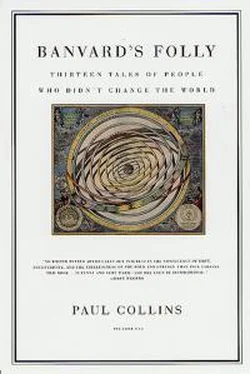Like any fashionable trend in 1809, the Amateur of Fashion made his first appearance not in London, but in the wealthy resort spa of Bath. He was hard to miss. The residents of the opulent York House hotel could scarcely fail to notice the dark-skinned and queerly attired man who started showing up at morning breakfast and afternoon tea. He was so deeply tanned that it was difficult to tell whether he had been entirely white to begin with; the exotic hue of his skin, in a room filled with ladies who had rendered themselves so fashionably pale with arsenic that their lips had turned blue, was only heightened by his attire: he was entirely covered in expensive furs and wielded a thick cane with a large diamond set into the top of it. At night, he would dress resplendently in a vaguely Hessian uniform and stud his entire outfit with diamonds: diamond buttons on his shirt, diamond buckles on his shoes, and the ever-present diamond cane. He was borne about town in a huge, gleaming carriage built in the shape of a scallop shell and emblazoned with the coat of arms of a crowing rooster. Written beneath the brazen fowl was this motto:
Whilst I Live I'll Crow
A pair of expensive matched white horses led the procession.
The nobles whispered among themselves in the breakfast room, trying to decipher the fellow, who all the while sat happily unaware in a corner of the room, scarfing down a hearty morning provision of muffins and eggs. Some thought that he might be an Eastern prince, a traveling rajah. Upon discreet inquiry, though, they discovered his name was Robert Coates. But nobody was quite sure who he was or where he had come from.
Robert Coates was determined to soak in the world of Fashion, for it had already been denied to him for far too long. He was born on a sugar plantation in Antigua in 1772, where his father, Alexander, possessed twenty thousand acres of land and vast wealth; one time when His Majesty's representatives sheepishly asked for a l5,000 loan to protect the island from an impending Spanish and French raid, Alexander Coates blithely sent them away with a pledge of l10,000.
For all his wealth, Alexander was helpless against the appalling mortality rate among children of that time. Parents back then might wait months before even naming their offspring, and with good reason--it was not wise to pin too many hopes on the survival of any one child, not in a land racked with malaria, dysentery, and yellow fever. And so it came to pass that all of Alexander's nine children died in infancy or early childhood ... except for one. It would not have been untoward for Robert Coates to think that, surviving against such odds, destiny had mapped out a special fate for him.
Alexander Coates dutifully sent his one remaining son back to the Old World at the age of eight so that he would receive the classical education expected of any young gentleman of means. The effect of this change for little Robert was absolute and permanent. Although his father had accompanied him on the way over to London, there was nothing else familiar about the land before him.
Robert had grown up among the sunny, fertile, and endlessly vast plantations of an island thousands of miles away. But he was now in the world's most densely populated city, mingling with boys who were classmates in both senses
of the word--for beneath their childish fancies lurked the future aristocracy and governance of the country. He grew to love the sophistication and artistry of this new land, and was deeply unhappy to be recalled to Antigua upon the completion of his education.
After making the long and perilous voyage back home, Coates was asked by his father what he wished to do in life. Young Robert had a ready answer: he wished for a commission in a British regiment, so that he might serve alongside the Duke of York. Europe was engulfed in war at this time, though, and Alexander could not bear the thought of his only remaining child being mere cannon fodder, or even of his simple absence for yet another decade back in Britain. Instead, he sent him off on a shorter tour--just a few years, this time--of Britain and then the United States, so that his education might be complete.
Settling back down in Antigua by the turn of the century, Robert felt the provinciality of the place press upon him, and he eagerly grasped at any twig of culture or outside civilization that floated by. Among the island's thin fare of entertainments was a theatrical company composed of a few islanders, an orchestra drawn from soldiers from the island's British garrison, and any stray actors that happened to be passing through the colony. Coates joined this company and became an enthusiastic participant in its productions of Shakespeare. The audiences of islanders and soldiers liked their Shakespeare rare and bloody rather than well done, and the troupe excelled at putting on crudely staged, high-body-count tragedies like King Lear, Macbeth, and Romeo and Juliet.
Coates spent years devoted to such pursuits, giving extra zeal to learning the part of Romeo, while assiduously avoiding any hint of gainful employment. But he didn't really need any: he was his father's son, and there would be a job open for him when his father died. When his father's end finally did come, though, his son found that he had absolutely no inclination to oversee the family business. With a fortune now at his disposal-l40,000 a year, an astronomical sum back then--he decided to leave management of the plantation to an underling; after a suitable period of mourning for his father, he boarded a vessel bound for his true homeland: England.
One guest at York House, Pryse Gordon, finally did gather up the audacity to acquaint himself with the strange inhabitant of the breakfast room: He shortly attracted my notice by rehearsing passages from Shakespeare during his morning meal ... I could not help complimenting him on the beauty of his recitations, although he did not always stick to his author's text. On one occasion I took the liberty of correcting a passage from Romeo and Juliet.
"Aye," said he, "that is the reading--I know, for I have the play by heart--but I think I have improved upon it."
This stranger, Gordon discovered, was so devoted to the character of Romeo that he kept a character costume packed with him on all his travels. Then why not, Gordon asked him, play the part of Romeo here in Bath?
"I am ready and willing to play Romeo to a Bath audience, if a manager will get up the play and give me a good Juliet," Coates said grandly. "My costume is superb and adorned with diamonds."
Gordon gave him the address of a local theater manager and offered himself as a reference. Coates hurriedly tucked in his breakfast, invigorated by the prospect of treading the boards once again, and set off in his grand coach.
But when he reappeared an hour later, he was clearly outraged.
"That fellow," he huffed, "has treated me in a manner I am not accustomed to
... I will show him I can play Carte and Tarte!"
Snapping up his diamond cane like a fencing sword, he thrust and cut it straight at the heavy wooden door into the dining room, driving his point home with an earsplitting crack against the baize that sent an old man jumping out his seat.
Perhaps a flash of the diamond scepter was all that was ever needed, for soon afterward the Bath Theatre made an announcement to the public that the next week, on February 9, 1809, would bring them
ROMEO, BY AN AMATEUR OF FASHION
The Bath Theatre was sold out that night; ladies of fashion and rascals alike had packed the seats and boxes to peer at the lavish man whose every detail seemed to be known to one and all--save for who he was and where he'd got his money from.
When, late in the first scene, Coates swept upon the stage, there was an eruption of applause and perhaps a gasp of consternation. He was indeed, one witness recalled, wearing his very own Romeo costume, and moving in his own unique way:
Читать дальше











